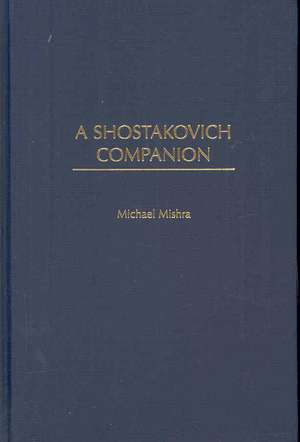A Shostakovich Companion
Autor Michael Mishraen Limba Engleză Hardback – 29 iun 2008 – vârsta până la 17 ani
Preț: 473.43 lei
Preț vechi: 616.43 lei
-23% Nou
Puncte Express: 710
Preț estimativ în valută:
90.59€ • 94.58$ • 74.98£
90.59€ • 94.58$ • 74.98£
Carte tipărită la comandă
Livrare economică 05-19 aprilie
Preluare comenzi: 021 569.72.76
Specificații
ISBN-13: 9780313305030
ISBN-10: 031330503X
Pagini: 640
Dimensiuni: 156 x 235 x 43 mm
Greutate: 1.13 kg
Editura: Bloomsbury Publishing
Colecția Praeger
Locul publicării:New York, United States
ISBN-10: 031330503X
Pagini: 640
Dimensiuni: 156 x 235 x 43 mm
Greutate: 1.13 kg
Editura: Bloomsbury Publishing
Colecția Praeger
Locul publicării:New York, United States
Notă biografică
MICHAEL MISHRA is Professor and Director of Orchestral Studies at Southern Illinois University Edwardsville. He was the First Prize winner of the 2003 Vakhtang Jordania International Conducting Competition in Ukraine, and frequently performs in the Czech Republic, where he has conducted the Karlovy Vary Philharmonic, the Hradec Kralove Philharmonic, and at the Silesian State Opera. In 2001, he made his debut with the Bulgarian National Radio Symphony Orchestra in Sofia, and has recently appeared with orchestras in Russia, Ukraine, Argentina, Austria, and in South Korea. He has presented papers at Shostakovich conferences in Glasgow, Cambridge, and London.
Cuprins
AbbreviationsA Note on TransliterationI. SHOSTAKOVICH RECEPTION by Michael Mishra1. Shostakovich Reception History2. On Shostakovich3. The Testimony DebateII. THE LIFE AND STYLISTIC EVOLUTION OFSHOSTAKOVICH by Michael Mishra4. Youth, Revolution, and Fame (1906-1926)5. The Modernist and the Iconoclast (1926-1931)6. Rise and Fall; Fall and Rise (1932-1937)7. Maturity (1938-1947)8. DSCH (1948-1953)9. The State Composer: Compromise and Dissent (1954-1965)10. I lived onin the hearts of my true friends (1966-1975)III. ANALYZING SHOSTAKOVICH11. Shostakovich the Dramatist: The Nose and The Lady Macbeth of the Mtsensk District by James Morgan12. Shostakovich and Wozzecks Secret: Towards the Formation of a Shostakovich Mode by David Haas13. Shostakovichs Trademark Form: The Arch-Sonata in the First Movement of the Fifth Symphony by Michael Mishra14. The Twenty-Four Preludes and Fugues, Op. 87: Structural Model and Manipulation by Andrew Grobengieser15. Shostakovich, the Passacaglia, and Serialism by Lyn Henderson16. Film, Narrative, and Shostakovichs Last Quartet by Richard BurkeIV. ASPECTS OF SHOSTAKOVICH17. Shostakovich and the Cinema by John Riley18. Shostakovich the Pianist by Sofia Moshevich19. The Shostakovich Legacy by Louis BloisBibliographyIndex of Shostakovich WorksIndex of Names and SubjectsAbout the Contributors
Recenzii
The book is noteworthy for its evenhandedness; it does not dramatize Shostakovich's problems with the bureaucracy but makes clear how those problems affected the composer's life and the creation of his music. . . . Recommended. Upper-division undergraduates through faculty and professionals.













